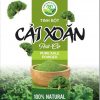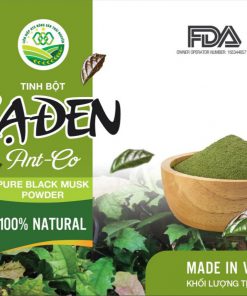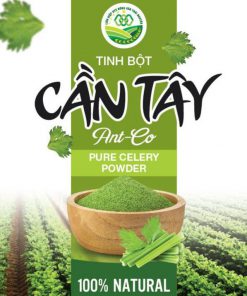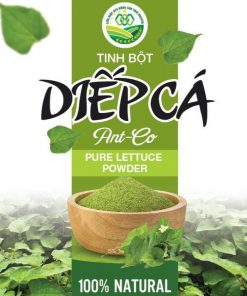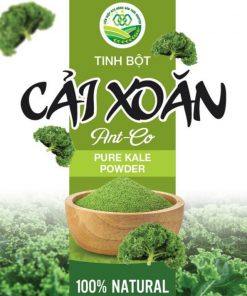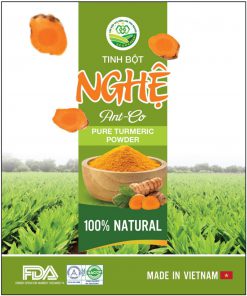Ant-Co Pennywort Powder
Brand: Ant-Co
Weight: 70 grams (2g/pack x 35 packs/box), 100 grams, 500 grams
Produced by: Thai Nguyen Agricultural Cooperation Union
Made in: Thai Nguyen, Viet Nam
Ant-Co Pennywort Powder with Product Barcode: 8938542011234
Ingredients: 100% pure pennywort leaves.
Uses:
- Good for the cardiovascular system.
- Improve memory.
- Healing.
- Cooling, detoxifying.
- Reduce fever, reduce cough.
- Sedation, reduce stress.
- Skin beauty.
- Cooling down, reducing fever, cooling the liver: Pennywort is a herb with welding (cold), tan (spicy), bitter (bitter) properties that has the effect of nourishing sound, clearing heat, laxatives of the liver, detoxifying… Drink Pennywort juice. Grind or smoothie with Pennywort to help beautiful skin and clear body heat. This is a common use in Pennywort known by many people.
- Cure Digestive Diseases: The anti-inflammatory and antioxidant activity of Pennywort leaves has a significant effect on improving the health of the intestines and colon. Pennywort also helps to significantly improve constipation in both adults and children.
- Circulatory System Support: Cellella asiatica extract strengthens the walls of blood vessels and capillaries, prevents bleeding, and optimizes the circulatory system. Pennywort also helps stimulate blood circulation, increase oxygenation in body parts and important internal organs. From there, these internal organs and organs function efficiently.
- Purify the body: Pennywort can stimulate the body to excrete toxins, salt, water and even excess fat in the body through urine. This process relieves stress on the kidneys and generally helps to remove toxins quickly, while keeping the body healthy and fluid in balance.
- Good for people with diseases related to veins: Experts say, Pennywort is especially good for people with diseases related to veins. The components of Pennywort can help reduce swelling and blood circulation in the body, especially good for people with diseases such as varicose veins.
In 2001, scientists conducted a study that demonstrated the benefits of Pennywort for people suffering from diseases related to veins. Patients were given a placebo or Pennywort and were monitored for 4 weeks. The results showed that symptoms such as cramps, pain, fatigue, swelling, and leg edema were significantly reduced in the subjects who drank Pennywort.
In addition, the researchers also noted that taking gotu kola about 180mg a day was effective in reducing symptoms related to high blood pressure.
- Helps wounds heal faster: Pennywort contains triterpenoids, which have the effect of speeding up the wound healing process. Applying crushed Pennywort on the skin can reduce swelling and cool the wound. This is an extremely good remedy passed down in folklore.
- Enhance memory and eyesight: According to folklore: The patient takes 3-5g of dried pennywort, powdered, and drunk with milk. This way helps to improve eyesight, the ability to concentrate, support to improve memory.
- In addition to the above uses, pennywort is also used to treat constipation, jaundice, vomiting blood, dysentery, bad breath, white blood cells, boils, heat rash.
How to use:
- For direct drinking: Use about 2g of pennywort powder, add a little warm water to wet the powder, then add about 200 ml of warm water (70 – 80 degrees) stir to dissolve immediately or add a little sugar depending on your preference. add ice to drink cold).Should use 1 time/day.
- Cook porridge, meal powder: Mix 1-2 g of powder in a little water and then add it to the porridge and stir for 1-2 minutes.
- Beauty: use 2g of pennywort powder mixed with water or yogurt/unsweetened fresh milk/honey to create a paste for face mask for 10-15 minutes, help with antibacterial, acne treatment, and skin firming.
- Treatment of burns: mix pennywort powder with water, apply it on the burned skin to help soothe the skin and quickly heal the scars. Combined with drinking.
Preserve:
Store the product in a cool, dry place. Avoid direct exposure to sunlight (preferably refrigerated).
Recommendation:
- Pennywort is a popular vegetable with many health benefits. However, users should not abuse it. Only 1 cup of pennywort mixed with pennywort powder should not exceed 4g (equivalent to 40g of fresh pennywort) per day. Do not use it continuously for more than 6 weeks.. If you want to continue using, stop at least half a month.
- Pennywort is cold, easy to cause cold stomach, diarrhea. So don’t overuse it.
- The dose of pennywort may vary from person to person, depending on age, medical condition, and several other concerns.
- Pregnant and lactating women should not use.
- Those who are trying to conceive.
- Do not use for people with liver disease.
- People with diabetes: People with diabetes should use the cheeks in a moderate amount. If taken too much and often will increase blood sugar levels.
- People who are taking antidepressants, tranquilizers. Pennywort can reduce the effect of drugs, reduce the effectiveness of disease treatment. Do not use for people who are allergic to any of the ingredients in pennywort. Allergic reactions to pennywort may include redness, itching, or a rash on the skin. Users may also experience abdominal pain, nausea, or strange-colored stools. Although these symptoms as well as the compounds in pennywort are very rare, you should consult your doctor or pharmacist before taking pennywort.
Related products
Pure Herbs & Vegetable powders
Pure Herbs & Vegetable powders
Pure Herbs & Vegetable powders
Pure Herbs & Vegetable powders
Pure Herbs & Vegetable powders
Pure Herbs & Vegetable powders
Pure Herbs & Vegetable powders


